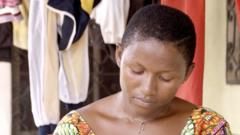In the shadows of an ongoing conflict, the South-West region of Cameroon has become a battleground for armed separatists striving for independence and government forces seeking to maintain control. Ngabi Dora Tue, still mourning the brutal murder of her husband Johnson Mabia four years ago, exemplifies the personal toll of this violent struggle. Johnson, an innocent bystander, was caught in a crossfire that has claimed thousands of lives since its roots took hold nearly a decade ago.
What began as peaceful demonstrations in 2016 rapidly devolved into a grim conflict fueled by long-standing grievances of the English-speaking minority. They felt marginalized by a predominantly francophone government, leading to the emergence of separatist groups advocating for the Federal Republic of Ambazonia. Unfortunately, the conflict has not only devastated lives—a staggering number of over 6,000 fatalities has been recorded, and the daily struggles of the population have escalated into a nightmare of abductions, killings, and loss.
Blaise Eyong, a local journalist, reflects on the grim reality faced by families in this region. "We used to wake up in the morning to dead bodies on the streets," he recounts, painting a vivid picture of fear and uncertainty. The conflict has led to mass displacements, with many innocent civilians becoming collateral damage in a war that feels remote from the international community's gaze.
Despite various attempts at dialogue, including a "major national dialogue" in 2019, practical resolutions remain elusive. Felix Agbor Nkongho, a key figure in the 2016 protests, notes that confidence in both sides has eroded. Abuses have been widely reported, with Human Rights Watch documenting severe governmental response to the crisis, including extrajudicial killings and village destruction.
The relentless violence has created an environment where mistrust reigns. Recent examples highlight the brutality of the state forces and the separatist fighters alike, who have both contributed to an atmosphere of terror. In addition to fighting against government forces, internal divisions have arisen among separatist groups, further complicating an already dire situation.
As families navigate through their grief and despair, their futures hang in the balance. Dora, burdened with new responsibilities as a young widow, faces overwhelming challenges. The repercussions of the conflict extend beyond deaths; they stifle education, disrupt community stability, and erode the social fabric of the region.
In the face of this unrelenting violence, voices are calling for urgent international attention and humanitarian support. With millions caught in the undertow of this unresolved conflict, it becomes increasingly imperative to address the root causes and seek long-lasting solutions for peace and stability in Cameroon.


















